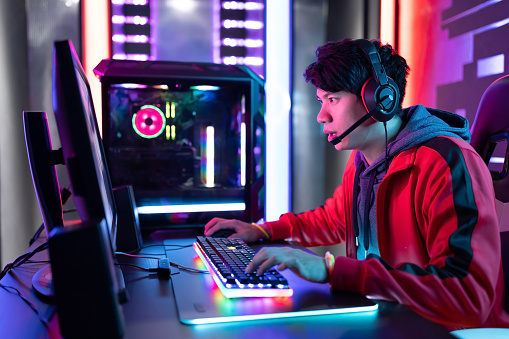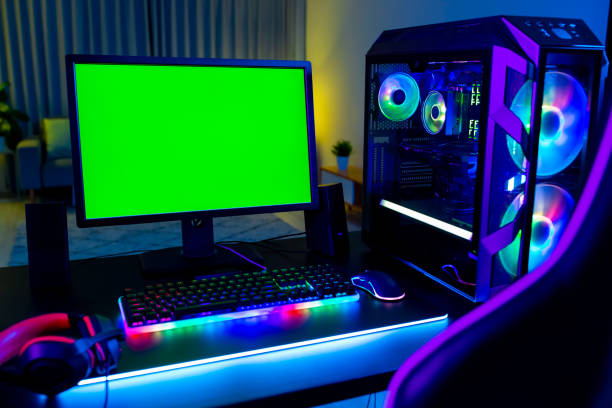This article is your complete guide to answering how many watts a gaming computer uses. The average mid-range gaming PC’s power consumption is between 300 and 500 watts. That said, there are many different sizes and kinds of gaming PCs with varying wattages.
We hope you find this post helpful, and if you are looking for different ways to become more energy efficient, be sure to check out our energy savings calculator!
The Energy Professor Electricity Rate Check Tool
Do Gaming Computers Use a Lot of Electricity?

To put it simply yes, gaming computers do use a lot of electricity in comparison to other computers, leading to higher electricity usage. High-end gaming consoles can use up to 1000 watts per hour of usage under full load, which is more than double a mid-range CPU or a typical gaming PC. If you have higher gaming PC wattage, your electricity bill could add up over time.
They also come as both desktops and laptops. Since this is different than your typical video game console, you may be wondering, how much power does a gaming PC use? This is the first thing that will make a difference in energy usage since laptops typically use less power than desktops anyway. However, gaming desktops will usually take the most energy out of any other gaming device.
How much power does a gaming PC use?
- Between 300 and 500 watts
This method provides accurate and immediate insights into the power draw of your gaming rig.
Key Takeaways
- Large desktop and gaming computers have significant power requirements, using between 200 and 500 watts of electricity on average.
- Using a computer for 8 hours per day will use about 12.2 kilowatt-hours of electricity per month and 146 kilowatt-hours of electricity per year.
- A computer costs an average of $1.73 to use for a month and $20.72 to use for a year.
Gaming desktops tend to be much larger than any other console. To compare, a typical laptop uses about 30 to 70 watts of electricity, and a PS4 gaming console uses 90 to 150 watts. Gaming computers need more power just to turn it on. Then, the game itself requires energy to run, which makes the gaming pc wattage high. These computers will generally have the most variety of games available on them. This means that they have to support a variety of graphics, styles, and physics.
Having said all of this, a less complex game will naturally take less energy to run. The more advanced and realistic the graphics, the more energy it will take to run the game. Furthermore, gaming computers also aren’t generally only used to play video games. Gamers will search online for solutions to difficult puzzles or battles and communicate with each other during online play, which also increases the gaming PC power consumption.
How Much Will Your Gaming PC Cost in Electricity?

If you’re running a high-end CPU for hours on end, you could add up to $20 to your energy bill a month. The power rating of your gaming PC’s power supply unit (PSU) can significantly impact your electricity costs. With that being said, if you have an average wattage for your gaming PC, around 300 – 500 watts, you’re looking at more than $10 a month for your PC.
Your gaming PC comes with more advanced hardware than a typical PC. For instance, a gaming PC usually comes with a more powerful graphics processing unit (GPU), which requires more electricity to operate to make the picture crisp and clear. However, the gaming PC electricity cost is going to be high because of this.
How much will the average gaming PC wattage cost per month?
Electricity cost is dependent on the state, and understanding your energy costs is crucial for budgeting. We will use New York for our example which has an electricity rate of .23 cents per kWh.
- If you use your gaming PC that takes 300 watts to run, 5 hours per day daily in New York, it will cost you an additional $10.35 on your monthly electricity bill.
- Another example – if you use a 500-watt gaming computer, 3 hours a day in Florida, it will cost you an additional $7.20 per month.
Understanding Gaming PC Electricity Usage
Gaming PCs are known for their high-performance capabilities, but they also consume a significant amount of electricity. Understanding how much power your gaming PC uses is crucial to managing your electricity bills and reducing your carbon footprint. The amount of electricity a gaming PC uses depends on several factors, including the type of components, the games being played, and the duration of use. Improving the energy efficiency of your gaming PC can help reduce electricity bills and minimize environmental impact.
On average, a gaming PC can consume between 300 to 500 watts of electricity. However, high-end gaming PCs with multiple graphics cards, overclocked processors, and advanced lighting systems can consume even more energy, up to 1000 watts or more. It’s essential to monitor your gaming PC’s power consumption to ensure you’re not wasting energy and to identify areas for improvement. By understanding your gaming PC’s power usage, you can make informed decisions to optimize performance while keeping your electricity bills in check.
Related post: Can a Power Surge Damage Appliances?
What Increases My Gaming Computer Power Consumption?

The average wattage for a gaming PC depends on various factors of the device you are using. Your gaming PC may use more or less than 300-500 watts due to several reasons. Like many other devices in your home, outdated appliances are typically the cause of increased electricity use thus spiking your electricity bill every month. Let’s learn more about the reasons your gaming PC is using more energy than it should be.
Factors that Increase Gaming PC Power Consumption
- Outdated devices – If your gaming PC seems to be using more electricity, it may be time to upgrade to a new model. When devices are outdated, it takes more power to run and causes your gaming PC to use a lot of electricity.
- Software – Due to the quality components of each gaming software, some games may cause
- Dust – If your PC has accumulated dust, it could be damaging to not only the device but your electricity bill as well. So before you try to figure out “how much does a gaming PC cost in electricity” make sure you dust it off first. Dust buildup can cause your PC to overheat thus making it have to work harder and use more power.
- Time spent playing – Like many other devices, the time spent with your gaming PC active will increase the amount of power it takes the PC to run.
Energy usage drops significantly when the computer is in sleep mode, using about 2.6-5 watts to maintain essential functions and keep the RAM refreshed, and further drops to 1.5-1.9 watts after shutdown. When it comes to choosing a power supply for your gaming PC, it’s crucial to consider the power demands of your system, opting for a minimum of 450W for entry-level gaming, and ensuring you choose a reliable manufacturer and check product reviews before making a purchase.
Components that Consume the Most Power
In a gaming PC, certain components are notorious for their high power consumption. Understanding which parts draw the most power can help you manage your system’s energy usage more effectively:
- Graphics Card: The graphics card is typically the most power-hungry component in a gaming PC. High-end GPUs can consume up to 250 watts or more, especially when running demanding games at high settings.
- CPU: The central processing unit (CPU) is another major power consumer. High-performance CPUs can draw up to 150 watts or more, particularly when overclocked or under heavy load.
- Power Supply: The power supply unit (PSU) is responsible for delivering power to all the components in your gaming PC. Its power consumption can range from 300 to 1000 watts or more, depending on the efficiency and the power demands of your system.
- RAM: While RAM consumes relatively less power compared to the GPU and CPU, high-end gaming PCs with large amounts of RAM can still draw up to 50 watts or more.
By identifying these power-hungry components, you can take steps to manage their energy consumption and optimize your gaming PC’s overall power usage.
How to Measure Power Consumption of PC
- Using a Power Meter: A power meter is a handy device that measures the amount of electricity used by your gaming PC. Simply plug your PC into the power meter to get real-time data on its power consumption. This method provides accurate and immediate insights into how much energy your gaming rig is using.
- Checking the Power Supply: The power supply unit (PSU) in your gaming PC has a wattage rating that indicates its maximum power output. By checking the PSU’s wattage rating, you can estimate the upper limit of your PC’s power consumption. This method gives you a ballpark figure of how much power your system might be drawing, especially under full load.
- Using Software Tools: Several software tools, such as CPU-Z, GPU-Z, and HWiNFO, can measure your gaming PC’s power consumption. These tools provide detailed information about the power usage of individual components, helping you identify which parts of your system are consuming the most energy.
By using these methods, you can gain a comprehensive understanding of your gaming PC’s power consumption and make informed decisions to optimize its energy usage.
Related post: Why is Energy Conservation Important?
How Much Energy Does a Gaming PC Use FAQ

Q: How much electricity does a gaming computer use in 24 hours?
Q: How much does it cost to run a gaming PC on electricity?
A: If you use your gaming PC that takes 300 watts to run, 5 hours per day daily in New York, it will cost you an additional $10.35 on your monthly electricity bill.
Another example – if you use a 500-watt gaming computer, for 3 hours a day in Florida, it will cost you an additional $7.20 per month.
Q: How many watts does a gaming laptop use?
A: Gaming laptops prove to be more energy-efficient, typically consuming between 200 to 300 watts, compared to desktops which demand around 500 or more watts during gameplay. The energy consumption of gaming PCs varies significantly across different models and usage intensities; mid-range PCs use about 300–500 watts per hour, entry-level ones consume around 300-375W, while very intensive gaming setups can peak at a whopping 1000 watts.
Q: Do gaming PCs increase electricity bills?
A: Gaming PCs can ramp up your electricity bill, especially with frequent use or a high-end setup. Powerful gaming rigs need a lot of electricity, driving up energy costs. But, it’s not just about power. How often and how long you play also matter. Hours of gaming daily? That can lead to a substantial rise in your monthly charges. To curb the costs, get to know your PC’s energy needs. Make smart choices about how and when you use it, and think carefully about upgrades. Your wallet will thank you.
Q: How much electricity does a gaming PC use?
A: The average mid-range gaming PC will use between 300 – 500 watts per hour. With that being said, there are many different models, which can significantly impact how much electricity you’ll be paying for.
Do you Need Cheaper Electricity?
If you’ve taken the time to understand the information on your bill and discovered you’re paying more than you’d like for your electricity, have you looked around for a cheaper deal? The Energy Professor has a wealth of information on ways to save on your utilities, including details of top deals that could significantly reduce your monthly or quarterly electricity bills.
We hope you found this article helpful! If you are looking for ways to increase energy efficiency and sustainability in your home be sure to take a look at all of the latest renewable energy options in your area. The Energy Professor helps residential and small business owners find qualified energy suppliers in New York, New Jersey, Pennsylvania, Texas, Ohio, Maryland, Illinois, and Massachusetts

